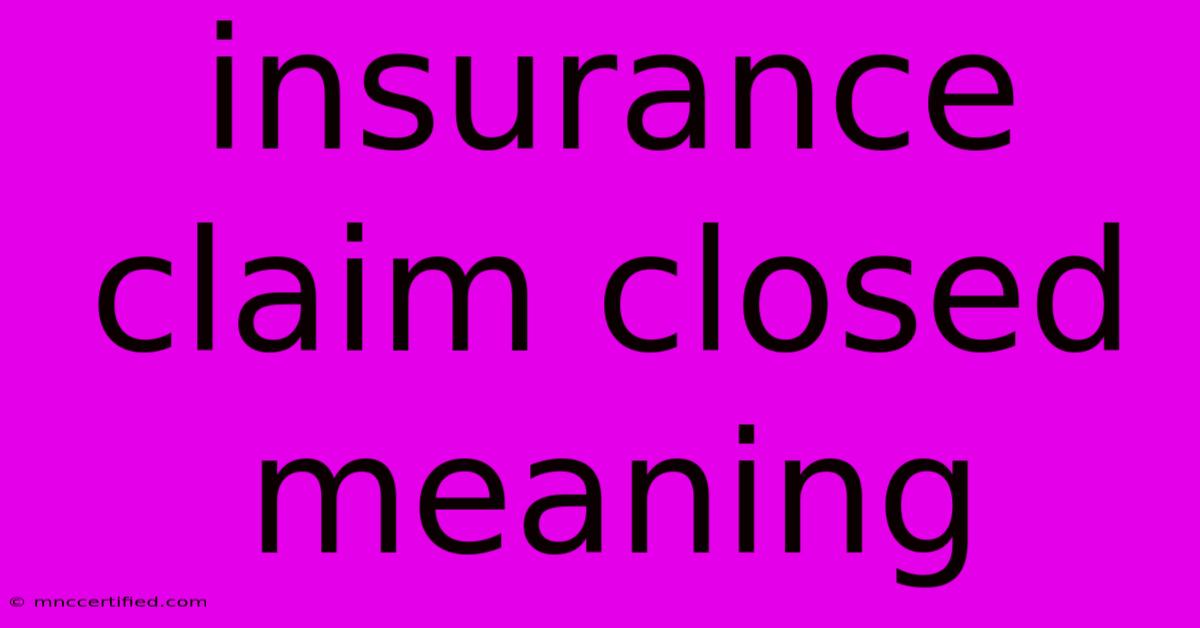Insurance Claim Closed Meaning

Table of Contents
Insurance Claim Closed: What It Means and What to Do Next
So, you've been through the process of filing an insurance claim, and you finally see those dreaded (or perhaps welcome!) words: "claim closed." But what does it really mean? Understanding the implications of a closed insurance claim is crucial, whether the outcome was favorable or not. This comprehensive guide will break down everything you need to know.
What Does "Claim Closed" Mean?
When your insurance company closes a claim, it signifies the end of their active involvement in your case. This doesn't necessarily mean you've received everything you're owed or that you agree with their decision. Instead, it indicates that the insurer has completed its investigation, made a decision regarding your claim, and concluded its internal processes related to your specific incident.
There are several reasons why a claim might be closed, including:
- Claim Approved and Payment Issued: This is the ideal scenario! The insurer has accepted liability, assessed the damages, and sent you the agreed-upon compensation.
- Claim Denied: The insurer has determined that you are not entitled to compensation based on their investigation and policy terms. This might be due to policy exclusions, insufficient evidence, or a determination that you were at fault.
- Claim Settled: This often applies to more complex cases, where negotiations between you and the insurance company led to an agreement on a settlement amount.
- Claim Withdrawn: You might have voluntarily withdrawn your claim before the insurer made a final decision.
- Claim Abandoned: If you fail to provide necessary information or cooperate with the investigation within a reasonable timeframe, the insurer may close your claim as abandoned.
Understanding Different Claim Closure Scenarios
Let's delve deeper into some specific scenarios and their implications:
1. Claim Approved and Payment Received:
Congratulations! This is the best-case scenario. Ensure you review the payment to confirm it matches the agreed-upon amount. If there are any discrepancies, contact your insurer immediately.
2. Claim Denied:
A denied claim can be frustrating. However, understanding the why is critical. Review the denial letter carefully. It should explain the reasons for the denial, citing specific policy clauses or evidence they used to reach their decision. You have options:
- Review your policy: Carefully examine your policy to understand its terms and conditions and whether the denial is justified.
- Gather additional evidence: If you believe the denial is unwarranted, gather any additional evidence that could support your claim.
- Appeal the decision: Most insurance policies allow for an appeals process. Follow the insurer's instructions carefully for filing an appeal. Consider seeking legal counsel if necessary.
- File a complaint: If you believe the denial is unfair or based on misconduct, you can file a complaint with your state's insurance department.
3. Claim Settled:
A settlement represents a compromise between you and the insurance company. Before accepting a settlement, ensure you understand the terms fully and that the amount is acceptable given the circumstances. Seek legal advice if you're unsure.
4. Claim Withdrawn/Abandoned:
In these cases, you may need to re-evaluate your options. If withdrawn, you may be able to refile a claim if new evidence emerges. If abandoned, rebuilding your case will require rectifying the issues that led to abandonment.
What to Do After Your Claim is Closed
Regardless of the outcome, maintain detailed records of all communication, documents, and payments related to your claim. This documentation will be invaluable if you need to appeal a decision or pursue further action.
Key actions to take:
- Review all documentation: Carefully examine the closure notification and any accompanying documents.
- Keep records: Maintain copies of all correspondence, receipts, and other relevant documents.
- Consult a lawyer: If you're unhappy with the outcome, particularly with a denied claim, consult with an attorney specializing in insurance law.
Preventing Future Claim Issues
Proactive steps can minimize future claim complications:
- Maintain accurate records: Keep meticulous records of your policy, property, and any relevant incidents.
- Understand your policy: Thoroughly review your policy to understand its coverage, limitations, and exclusions.
- Report incidents promptly: Report incidents to your insurer as soon as possible after they occur.
- Cooperate fully with the investigation: Provide all necessary information and documentation promptly.
By understanding what "claim closed" truly means and taking the appropriate actions, you can navigate this final stage of the claims process effectively and protect your rights. Remember, seeking professional legal advice is always an option if you feel your claim was handled unfairly.

Thank you for visiting our website wich cover about Insurance Claim Closed Meaning. We hope the information provided has been useful to you. Feel free to contact us if you have any questions or need further assistance. See you next time and dont miss to bookmark.
Featured Posts
-
Spy Allegation Russia Expels British Diplomat
Nov 27, 2024
-
November 26th Man City 3 3 Feyenoord
Nov 27, 2024
-
Manchester City Sports Business School Opens
Nov 27, 2024
-
National Lloyds Home Insurance
Nov 27, 2024
-
Top Wildlife Photos Peoples Choice
Nov 27, 2024